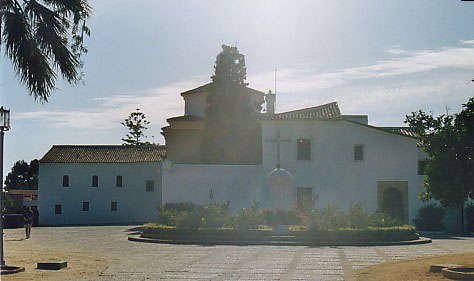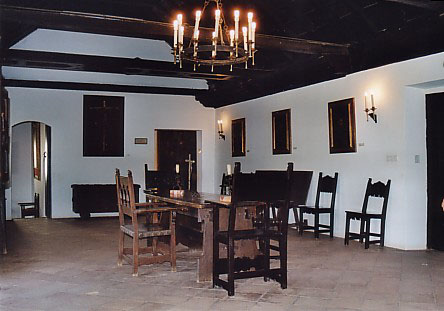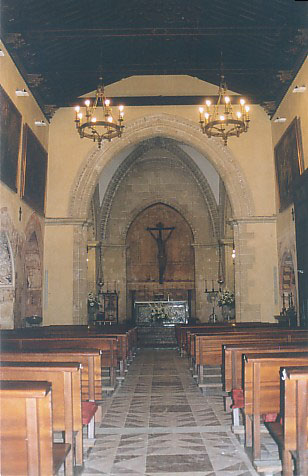
The First Mission
The Monastery
of La Rábida
( Huelva, Spain
)
by Luife Galeano

|
| The monastery of La Rábida as it stands today. |
Situated on a hill 30 meters above sea level, the humble monastery was constructed on the remains of a rápita, or small Muslim shrine, in the second half of the Thirteenth Century. In its origin, the building was considered a fortress-sanctuary of the Order of the Temple and, in the Fifteenth Century, ascribed to the Franciscan Order by Benedict XIII on December 6 th, 1412 in his bull1 Etsi cunctorum. This document is considered the foundational charter of La Rábida. The document allowed Friar Juan Rodriguez to live in community with twelve other monks on the premises. Ten years later, Pope Martin V allowed the number of friars residing in the complex to double in his bull Sincerae devotionis affectus issued in Rome on December 8th, 1422. Many years went by and the monastery passed from one religious jurisdiction to another as political and ecclesiastical powers came into being. Nowadays, the Franciscan order administers the monastery both in its religious and tourist streams.
However, I was not particularly interested in these aspects. I wanted to wander off in time. I sat by the entrance and began to imagine…
It is the year 1485; Christopher Columbus has arrived at the monastery after a long journey throughout Europe searching for financial support for his delirious idea. He is certain that he has found an alternate route to the East. However, these are trying times and neither the Italic States nor the Portuguese king have listened to his pleas. Neither have the French listened. His only recourse is to pursue an audience with the Catholic Kings. With these premises, I began to wonder why he traveled to a small monastery on the southwest part of the Spanish reign. There are several reasons. For one, the Catholic Kings are preparing the campaign to conquer the Muslim kingdom of Granada. Columbus needs to be in the proximity of the Spanish Court. Secondly, the monastery is a popular place of pilgrimage and many influential families could be found there. He, most surely, could find the necessary support. Perhaps, if he could talk to the abbot for guidance…
"Come, Christopher. Join me in the capitulary room. There are many things we must discuss."
 |
The Capitulary Room in La Rábida. A place where Columbus and the abbot met frequently. |
"These are times of hardship. The king and the queen, God bless their holy undertaking, are preparing the assault of the Kingdom of Granada. It will, certainly, take them many years to prepare the campaign and, only God knows, how long to penetrate the thick walls of the Alhambra."
"But, Monsignor, this endeavor could be carried out in the meantime and…"
"Endeavors require large amounts of capital and that is something our royal highnesses will not partake of. They will need large sums of gold and silver to accomplish the holy deed of expelling the infidels from our blessed land."
"However, I still think…"
"Come, my impatient brother in Christ, let us join the community at the refectory for supper and prayers. You are in need of both. How long has it been since…?"
They left the room and crossed the cloister discussing the possibilities of an eventual meeting in the future, the alternatives, the different plans and the probabilities of success. Columbus' head was in turmoil. There were so many things that had to be done. As they crossed the cloister, the abbot turned to him.
"I suggest you walk in the cloister and meditate. My heart tells me that God is preparing something grandiose for you."
 |
| The cloister |
Supper at the refectory was very soothing. The friars were all very helpful and deeply concerned of Columbus' restlessness but the strict observance of the rules prevented them for inquiring the navigator for details. It was only after eating dessert and having said the concluding prayers that they were allowed to speak.
"Perhaps, brother Christopher could tell us more about that mysterious route to the Indies of China."
"Is it true, brother, that a sinister pilot told you where to sail?"
"Where did you pick up your strange Spanish with so many Portuguese words?"
 |
| The refectory |
"¡Come, brothers! —exclaimed the abbot— Let our guest don Cristobal rest from your unbearable tirade of questions. It is time for our night prayers."
Five years have passed and Columbus has been unable to meet the royal couple. He has, however, made an acquaintance with the Pinzon brothers in the nearby town of Palos de la Frontera. Plans have been discussed for the arrangement of a future expedition to the Canary Islands but the oldest brother is in the employ of the Spanish navy and all his activities are centered on the immediate conquest of Granada. Columbus is desperate. Why is it that he who, on the one hand, finds it quite easy to live in the circle of the rich, of the successful, of the great bankers and cardinals finds it so hard to persuade the kings that he has a good idea?
One September morning of 1490, the abbot summoned him to the conference room.
"Come, we must talk."
 |
| The conference room |
"What are, precisely, the plans you intend to discuss with the kings? I have seen you for countless hours deeply embedded in the readings of the Imago mundi. Do you still persist on the idea of a round world?"
"My dear monsignor, I have no doubts about it. I have reasons to believe that a new land waits to be discovered on the route to the east."
"But, my dear son, that’s an abominable conclusion!"
"Indeed. I was considered a fool in the Portuguese court when I mentioned the possible existence of the island of Cipango. You see, I have designed three feasible routes. One is Asia, which seems to be the most convincing to my possible sponsors. Another is the Antipodes, which requires the acceptance of the earth's roundness and the last is the existence of a series of islands yet to be discovered."
"Thus the idea of Cipango."
"True, but I don’t think those theories will get me very far."
"Yes. You see, I have been doing some investigations on my own free time. I think it would be feasible to discuss your plans with Queen Isabella. She happens to…"
"Discuss my plans with a woman!"
"Listen to me! You haven't fared very well talking to kings and dukes, so you must change your approach if you pretend to be successful. I would concentrate on the new route to Asia and forget…"
"Monsignor! —a friar interrupted bolting into the room— the campaign for the conquest of Granada has begun!"
"The Lord has spoken, my dear friend. Let us wait for developments before we discuss your plans any further."
"But, monsignor, I…"
"Follow me into the chapel. I think we must pray."
 |
| The chapel at La Rábida |
Columbus spent countless hours praying in the chapel. Praying for his success, praying to convince the elusive sponsors to listen to his plans and praying that someday his dreams of a new world could become a reality.
The conquest of Granada finally came about on January 2nd, 1492. Two years had gone by. Two years in which Columbus kept nurturing his plans and embarking on expeditions along the coast of Africa to consolidate the dream he had in his head.
1Bull: a solemn papal letter sealed with a bulla or with a red-ink imprint of the device on the bulla. Bulla: round lead seal used by the Pope.
| Home | Contact Us | Credits | Sitemap |
© 2004 - Imagiverse Educational Consortium
